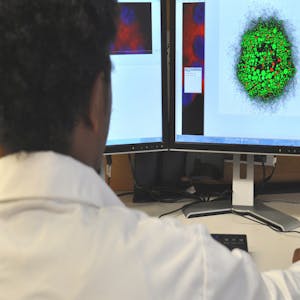The Systems Biology and Biotechnology course offers a comprehensive exploration of cutting-edge techniques and methodologies used in systems-level analysis of biomedical systems. Participants will acquire the ability to design and execute experiments, collect and analyze big data sets, and interpret findings quantitatively. The course covers a wide range of topics, including network analysis, dynamical modeling, and integrative skills development for the capstone project.
With a focus on practical applications, students will gain expertise in experimental methods such as RNA sequencing, mass spectrometry-based proteomics, flow/mass cytometry, and live-cell imaging. Through network analysis, participants will learn data integration and statistical methods, enabling them to process raw data and construct networks for further analysis. The course also delves into dynamical modeling techniques, including ordinary and partial differential equation-based models, as well as stochastic models used in contemporary Systems Biology research. Additionally, the course emphasizes the development of integrative skills through directed reading and analysis of current primary literature, preparing students for the capstone project as the final exam for the specialization in systems biology.
Certificate Available ✔
Get Started / More Info
The Systems Biology and Biotechnology course modules cover a wide range of topics, including introduction to systems biology, experimental methods, network analysis, dynamical modeling, integrated analysis, and the capstone project.
This course introduces contemporary Systems Biology focused on mammalian cells, their constituents, and their functions. Participants will explore the properties of subcellular and cellular systems, and gain an understanding of how emergent behaviors of systems arise. The course also covers the design, execution, and interpretation of multivariable experiments and the importance of quantitative reasoning, models, and simulations in understanding these systems.
Participants will learn about the technologies underlying experimentation in systems biology, with a focus on RNA sequencing, mass spec-based proteomics, flow/mass cytometry, and live-cell imaging. The course provides a broad overview of current experimental techniques and includes real wet lab environments to instruct on performing these techniques in practice and analyzing resultant data for quality and content.
This module provides an introduction to data integration and statistical methods used in contemporary Systems Biology, Bioinformatics, and Systems Pharmacology research. It covers methods to process raw data from genome-wide mRNA expression studies, including data normalization, differential expression, clustering, enrichment analysis, and network construction. The course aims to enable participants to utilize the methods presented in this course for analyzing their own data for their projects.
Students will be introduced to dynamical modeling techniques used in contemporary Systems Biology research, with a focus on ordinary differential equation-based models, partial differential equation-based models, and stochastic models. The course emphasizes the development of mathematical modeling techniques and their application in understanding biological processes and generating testable predictions for experimental validation.
This course focuses on developing integrative skills through directed reading and analysis of the current primary literature, enabling students to develop the capstone project as the overall final exam for the specialization in systems biology.
In this capstone course, students will apply the methods learned in the previous courses to work on a research project. To enroll in this course, participants are required to complete the Introduction to Systems Biology, Network Analysis in Systems Biology, Dynamical Modeling Methods for Systems Biology, Experimental Methods in Systems Biology, and Integrated Analysis In Systems Biology courses.
Systems Biology and Biotechnology course equips students with the skills to design and conduct systems-level experiments, analyze big data, and develop practical...